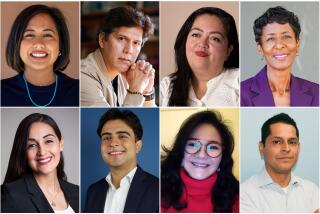PERSPECTIVE ON LOS ANGELES : To Riordan, Black Leaders: Carpe Diem : Conflicts have to be resolved; a one-time funding opportunity for redevelopment is at stake.
- Share via
When state Sen. Diane Watson blasted Mayor Richard Riordan at an event in South-Central Los Angeles, we were dramatically reminded of the mayor’s difficult relationship with the African American community. Elected in 1993 with only 15% of the black vote, Riordan has seen the relationship deteriorate, with uncertain political and economic consequences for both sides.
Black elected officials have a number of complaints against Riordan: staff and commission appointments that reflect declining black representation in city government; steps toward privatization of city services; the mayor’s refusal thus far to oppose a state ballot measure ending affirmative action; the mayor’s attacks on two prominent African Americans, Police Chief Willie Williams and MTA Chief Franklin White.
These important differences have been exacerbated by Riordan’s unusual approach to mayoral leadership. He seems to see himself as the city government’s CEO and has yet to adjust to the need to deal on a respectful basis with elected officials who have constituencies. He has managed to irritate a number of City Council members with this approach. He also tends to form power-brokering alliances with a few favored elected officials, and to expend vast time and energy trying to get rid of public servants whom he considers obstacles. Perhaps this is a good way to run a company, but it sows distrust at City Hall and obscures the clear message a leader needs to communicate.
Riordan also seems to be rather tone-deaf on racial matters, unable to understand why African American elected officials want to be consulted on issues vital to their constituencies or why African Americans might see racial implications in the attacks on Williams and White. He seems genuinely baffled at the anger he generates in the African American community.
African American leaders, however, are on the verge of demonizing Riordan as the second coming of Sam Yorty. This is a serious error. Yorty was a politician who consciously and effectively used racism to hold power. He had not the slightest interest in the economic development of the inner city, nor did he have the will or the ability to leverage private resources to that end.
Riordan, by contrast, has access to vast economic resources, the business skill to promote economic development and substantial interest in the inner city.
Framing the struggle as African Americans against the mayor will only worsen the already distressing isolation of the African American community in today’s Los Angeles. Riordan’s advisors may even believe that a public fight with black leaders can help him build political support elsewhere in the city.
Riordan also has something to lose from the continuation of this conflict. Like many Republicans, Riordan underestimates the loyalty of the black community to its elected officials. With 14% of the city’s population, the black community remains a relatively cohesive bloc of votes and leaders in an increasingly depoliticized city. A highly mobilized black community could not by itself threaten Riordan’s reelection in 1997, but it could help fuel a strong challenger. And if Riordan is seen as racially divisive, he will suffer political damage all around the city.
There is today a great, if fleeting, opportunity for economic development in South Central Los Angeles. President Clinton is highly committed to inner city development. The city is in line to receive a large block of federal funds as a consolation prize for its botched application for empowerment zone designation. In a presidential election year with an incumbent running for reelection, federal money may flow.
But political battles may prevent the city from fully utilizing this opportunity. The mayor wrongly believes that he can lead the economic resurgence of South Central while bypassing the area’s elected officials; he should reexamine that assumption. And African American leaders should give him the room to make that change. In the interval before congressional Republicans gut all remaining urban aid, a knock-down, dragged-out battle will do considerable harm both to the mayor and to the inner city.
More to Read
Sign up for Essential California
The most important California stories and recommendations in your inbox every morning.
You may occasionally receive promotional content from the Los Angeles Times.










